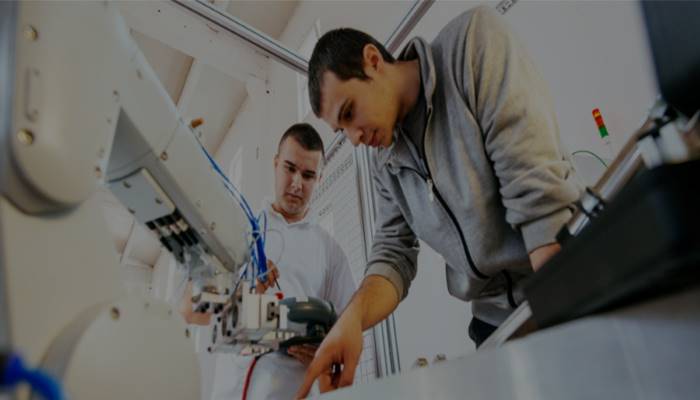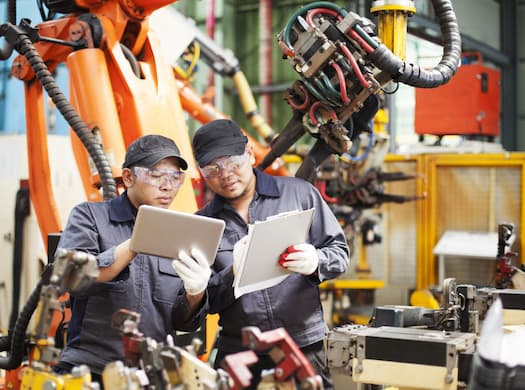News and Events
The robotics industry is constantly changing and evolving. New robotics technologies and developments in automation are quickly creating exciting career opportunities at every education level – from micro-credentials to PhDs. Here is where you can learn more about robotics careers in manufacturing and how these new technologies are benefiting workers


NEWS
Can Robots Do Jobs Without Human Help?
October 3, 2021When many people think of robots working in manufacturing, they feel a sense of dread over the prospect of having their jobs replaced with technology. Let us address that right away: Robots are creating more jobs than they’re taking away, with the impact of robots on jobs running in contrast to what many expected from the advent of industrial robotics.
In fact, the robotics job opportunities that are being created are more exciting, more skill-oriented, and less dangerous than the jobs that are being fulfilled by our mechanical counterparts. Sure, spot-welding the same things over and over for hours at a time might sound like a lot of fun (it doesn’t), but wouldn’t you rather let a robot handle that tedious and dangerous task while you monitor its progress?
That’s the thing with robots, you see. While they’re performing their programmed jobs and working tirelessly to boost productivity, there has to be one or more workers available to monitor, maintain, and program those robots.
So when we get asked questions like “Can robots do jobs without human help?,” the answer is never a simple yes or no. It’s a yes and a no, respectively.
Let’s take a look into why.
What Makes Humans Different from Robots?
Humans are different from robots in a lot of ways. There are the obvious physical differences; for instance, we are made of flesh and blood, but there are a lot of operational differences as well.
The human mind, for starters, is incredibly complex. In fact, it’s many, many times more complex than even the most complex robot in existence. The human mind is so complex that humans, after thousands of years of civilization, can only begin to comprehend it. It is the origin point for all of our experiences, the computer that processes everything we see, hear, feel, taste, and smell, all simultaneously. Even just one of those senses is delivering more data than can be processed by any machine in existence. Brains are truly wonderful, and the point of origin for all art and invention.
Robots, on the other hand, are still mostly only capable of what we tell them they are. Artificial intelligence is nowhere near the level of the human mind, and there’s no indication that it ever will be. That’s not to say it’s impossible, but it’s certainly nowhere in sight in this modern age of technology. When you ask, “what can robots do?” it’s more a question of what the robot was created to do, as opposed to the infinite scale of possibilities that a human mind works with.
Robots, on the other hand, are more capable at many physical tasks than we are. They’re stronger, able to lift and carry massive amounts of weight in many situations. They’re capable of precision that no human could ever achieve. They’re impervious to toxins and temperatures and other dangerous conditions that could seriously harm or kill a human being.
In other words, they’re great workers for a lot of tasks, but they need us to tell them what to do, as their programmed jobs, in a sense, are the sum of what they’re capable of doing.
Can Robots Program Themselves?
For most modern robots being used in manufacturing, the answer is no. Robots must be programmed.
However, there are self-programming robots that use artificial intelligence (AI) to self-program, and they’re becoming more popular with the advancement of technology. Self-programming might not mean exactly what you’re thinking of, though.
Let’s say you ask somebody to bring you a cup of water. That person will leave the room, walk to the kitchen, grab a cup, fill it with water, walk back out of the kitchen and return to you and hand you the cup of water.
For a robot to perform this same task, you’d have to program every step of the process into its operating system. You’d have to tell the robot to leave the room, travel to the kitchen, acquire a cup (including how much force to use when grasping the cup so as not to crush it), etc. In short, you’d have to tell the robot exactly what to do and how to do it for every tiniest step of the process to get you a cup of water. You’d have to think about the tiniest details that your mind and body do without any thought. As you can imagine, until this part of the process is fully fleshed out, the impact of robots on jobs will still involve a human overseer for the time being.
So when we talk about self-programming robots, we’re talking about robots that can fill in all those steps using artificial intelligence. You instruct the robot to get you a cup of water, and the robot fills in the blanks needed to accomplish that task. It perceives the environment and knows the process constraints, and then executes the task on its own. While the robotics industry as a whole is working toward moving away from the limited capabilities of programmed jobs, this is still the order of the day in terms of manufacturing robotics.
One area where self-programming robots are being utilized in manufacturing is in spray processes. Vision sensors and robotic accuracy are at the point now where a self-programming robot can handle powder coating, liquid painting, shot peening, sandblasting, thermal spraying and glue dispensing all on its own as the situation demands. In fact, the ARM Institute is working with one such project at this very moment.
Who knows what the future will bring in terms of self-programming robots, but we’re very excited to find out.
Why Can Robots Never Replace Humans?
The simple fact is that, no matter how advanced robots become, there will always be a need for people to work with, on, and alongside them. There will always be a need for technicians to maintain, operate, and input programmed jobs for robots. Specialists will always be needed to help plan and design robotics systems in a way that optimizes manufacturing performance. Integrators will always be needed to design the robots themselves and consult on installing new systems on manufacturing floors.
In fact, the need for robotics workers is only increasing alongside the advancement of robotics technology. There are millions of robotics jobs that need to be filled, and a shortage of workers with the necessary skill sets to fill them, with the impact of robots on jobs coming out to an overall positive growth in the industry and its needs for human workers.
That’s why we made RoboticsCareer.org, a place where people interested in working with robotics can find accessible training and education programs from all around the country. If you’re one of those people, feel free to use our search tool on the homepage and get started on your journey to one of the most exciting careers in the modern world.


